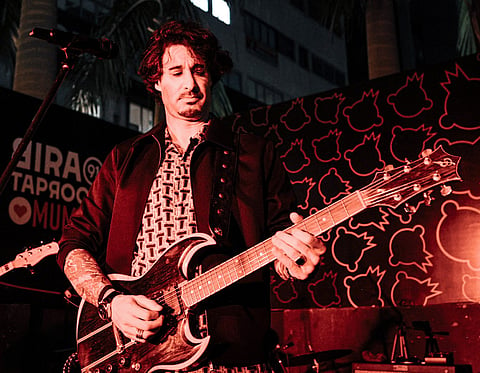A jack of all trades, Daniel Weber finds his calling in music and storytelling
A fusion of genres has been an ongoing trend in all forms of art. This has also caught on to the musical landscape where the boundaries made by different styles are blurring, uniting artistes. While fusion music has been topping charts, there are some artistes who find their voice in the classic forms. We speak to one such artiste, Daniel Weber whose music oozes old-school rock. He opens up to us about his new album Believer, his influences, fatherhood, his journey as an entrepreneur and more.
What was the inspiration behind Believer?
A lot happened in my life last year, which became the main source of inspiration. I was sick for about four months, and during that time, my faith in God deepened significantly. The music I was writing then reflected everything I was going through — both lyrically and musically. I believe we should hold on to hope and faith, not just on bad days but always.
The soundscape of your album leans towards old-school rock…
I grew up listening to ’70s and ’80s American music — delta blues, bluegrass, rock and roll — all of which shaped my musical style. While traditional rock music focuses heavily on riffs, my songs are more lyrically driven.
When did you realise you wanted to become a musician?
I’ve been drawn to music since my school days. I’ve played the guitar for about 35 years now, but before that, I played the drums. When I was around nine or 10 years old, I realised I was captivated by music, especially lyrics rather than riffs. I love breaking down thoughts and emotions, which naturally turn into stories. I started writing songs, poems, and short stories at 12, and by 14, I had filled around 180 pages with lyrics. Looking back, not all of them were actual songs—some were just stories waiting to be told.
Your background is culturally diverse, with your father from Rome, your mother from Israel, and Sunny from India and the US. Has this influenced your music?
Absolutely. Spending time in different places inevitably becomes a part of who you are. It’s like how a chef adapts local flavours into their cooking—immersion leads to evolution.
Once, I was asked to play Laila Main Laila at an event. When I went home to listen to it, I realised how layered the riffs were, and my respect for the musicians behind it grew tremendously. Experiences like these shape my approach to music.
You’ve been an actor and a director. Has that influenced your music-making process?
I’ve done some acting and directing, but I wouldn’t call myself either. Sunny (Leone) shoots for 40-50 days straight, but I could never do that. Touring with music for even a week feels more fulfilling to me.
When I create music, I conceptualise, arrange, and explain the respective parts to musicians. On a film set, too many people are involved, and I find that unsettling. Maybe I’m a bit of a control freak.
You also have multiple business ventures. How do you balance art and entrepreneurship?
For me, they go hand-in-hand. I don’t approach business in a traditional way — I use my creative side while building my brand. When I don’t engage in music, I notice it affects my business as well. But when I manage both simultaneously, there’s a rhythm, and my brain functions more creatively. I think being creative gives me an edge in my business.
Has fatherhood influenced your musical journey?
My kids are the most important part of my life, so they’ve influenced me deeply. This album features a song called Strong for You, inspired by a conversation with my daughter, Nisha.
We had a death in the family, and my kids were struggling with it. One night, as I was putting them to sleep, Nisha asked, “Why aren’t you crying? Doesn’t it hurt you?” I explained that my job — and their mother’s — is to stay strong for them. Life and death are inevitable, regardless of race, gender, or background. Some people encounter it later in life, while others experience loss much earlier. But no matter when it happens, I hope they have someone to be strong for them.
After that conversation, I went to my room and wrote the entire song in about eight minutes.
Do you think there’s a difference between audiences in India and the West?
Yes. The audience in India isn’t as receptive to original American music. They either prefer covers or songs in languages they relate to.
You’ve been part of bands and have performed solo. How do those experiences compare?
I’ve been part of The Disparrows and The Spyderz, and both experiences were incredible. Touring with different artistes influences your music in countless ways, but the biggest lesson is learning how to work with people. Musicians are like grown-up children — you sometimes have to sit everyone down, ask them to relax, and acknowledge that someone else’s idea might be better than yours.
What are you looking forward to this year?
Health, happiness, and family always come first. Musically, I’d love to perform at festivals, and I have some exciting collaborations in the work.

